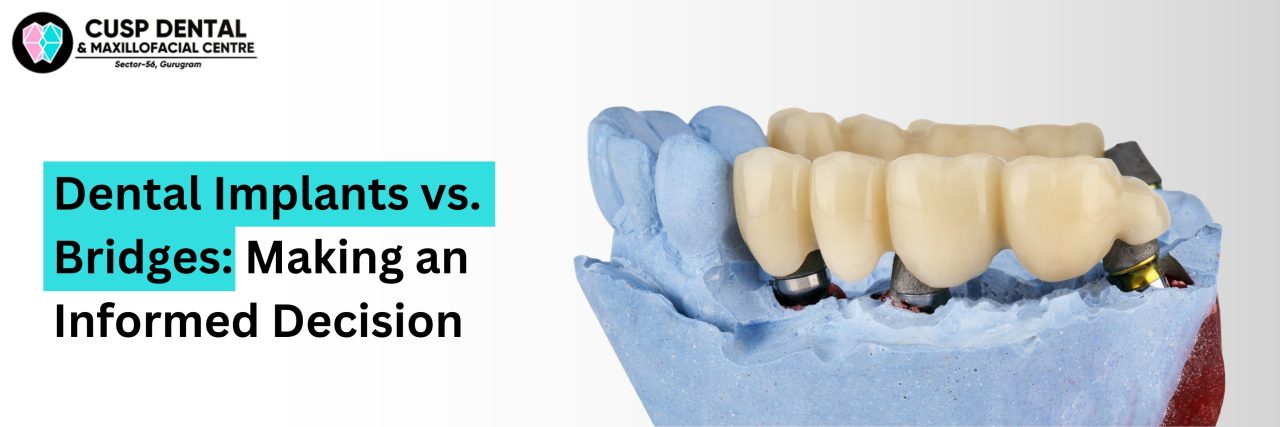Life is unpredictable, which has plenty of challenges for people, and tooth injuries and decay are very common—and often the most unexpected. But when these injuries happen, people are always curious about the best replacement option for natural-looking teeth.
The two most recommended solutions are dental implants and dental bridges. While both can restore function and appearance, each comes with its own pros, cons, and suitability.
This blog breaks down the differences between dental implants and bridges to help you make an informed decision about your oral health.
What Is a Dental Implant?
A dental implant is a titanium post surgically placed into your jawbone, this acts like a tooth root. A crown is then attached to this post to create a natural-looking, durable artificial tooth.
Key Features:
- Titanium screw integrates with the bone (osseointegration)
- Permanent solution
- Mimics natural tooth in appearance and function
What Is a Dental Bridge?
A dental bridge literally “bridges” the gap left by missing teeth. It consists of one or more artificial teeth anchored to neighboring teeth (abutments) using crowns.
Key Features:
- Non-surgical
- Anchored using existing teeth
- Suitable for one or more missing teeth in a row
Visual & Functional Differences
| Feature | Dental Implant | Dental Bridge |
| Procedure | Surgical (implant into bone) | Non-surgical (crowns on nearby teeth) |
| Appearance | Highly natural-looking | Looks natural, but less than implants |
| Longevity | 15+ years (often lifelong) | 5–15 years with care |
| Jawbone Health | Prevents bone loss | Does not prevent jawbone shrinkage |
| Tooth Preservation | No damage to nearby teeth | Requires shaping of adjacent teeth |
How Is Each Procedure Done?
Dental Implant Process:
- Consultation & Imaging – X-rays or CT scans to assess bone structure
- Implant Placement – Titanium post is inserted surgically
- Healing Time – 3–6 months for the implant to bond with bone
- Crown Placement – A custom crown is fixed on top
👉 Advantage: Long-lasting and behaves like a natural tooth
Note: Needs healthy bone structure and good overall health
Read More: How Long Does the Dental Implant Process Take?
Dental Bridge Process:
- Tooth Prep – Adjacent teeth are filed down to hold the bridge
- Impression – Moulds are taken for a custom fit
- Bridge Fabrication – Artificial teeth are crafted in a lab
- Fitting – Cemented into place over adjacent teeth
👉 Advantage: Quicker and more affordable
Note: Requires altering healthy teeth
Cost Comparison
While prices vary by location and clinic:
- Dental Implants: INR 30,000–75,000 per tooth
- Dental Bridges: INR 15,000–35,000 for a 3-unit bridge
Though implants are more expensive upfront, they typically last much longer, making them cost-effective over time.
Bone & Gum Health Impact
Dental Implants:
- Stimulate jawbone, preventing bone loss
- No effect on surrounding teeth
- Support facial structure
Dental Bridges:
- Do not prevent bone resorption under missing tooth
- Stress placed on adjacent teeth can lead to complications
- May require replacement over time
Which Is Better for You? Factors to Consider
1. Age & Overall Health
- Implants are ideal for younger, healthy patients with strong jawbones
- Bridges suit older patients or those unfit for surgery
2. Number of Missing Teeth
- Single or spaced missing teeth = Implants
- Several adjacent missing teeth = Bridge may be easier
3. Budget
- Short-term = Bridge
- Long-term investment = Implant
4. Bone Health
- Sufficient jawbone = Implant
- Weak or insufficient bone = Bridge or bone grafting needed
Maintenance & Oral Hygiene
Both solutions require good oral hygiene, but:
- Implants: Act like natural teeth. Brush, floss, and check-ups required.
- Bridges: Need extra care under the pontic (false tooth) and more attention to prevent decay on crowned teeth.
Failure to maintain hygiene can lead to implant failure or bridge loosening.
Pros and Cons: Quick Snapshot
Dental Implants
Pros:
- Long-lasting (often lifelong)
- Preserves jawbone
- Doesn’t affect other teeth
- Feels natural
Cons:
- Higher upfront cost
- Surgical procedure
- Longer healing time
Dental Bridges
Pros:
- More affordable initially
- Faster treatment
- Non-surgical
Cons:
- May need replacement
- Involves healthy teeth
- Doesn’t prevent bone loss
Conclusion: Talk to Your Dentist Before Choosing
There’s no one-size-fits-all answer—your dental and overall health, bone condition, budget, and personal preferences all matter.
For most people:
- Implants offer the most durable, natural, and bone-supportive option.
- Bridges work well when you need a quicker, less invasive, and affordable fix.
Consult an expert dentist at the best dental clinic like Cusp Dental Clinic in Gurgaon for a full evaluation to determine which treatment aligns perfectly with your smile goals.


